Captain America: The Winter Soldier Review **Spoiler Alert**
As a feminist and a huge fan of Black Widow, I walked into Captain America: The Winter Soldier with anxiety and hope.
While Marvel Studios has done a good job portraying female characters, I was a bit scared that the movies would follow the comics by harming or killing off women for the sake of “manpain” and male character development. My hopeful attitude stemmed from the press interview circuit, where the cast members constantly mentioned how the film would “explore” more of Natasha Romanoff’s past and character.
Overall, the movie was super enjoyable. The title is sort of misleading, as the Winter Soldier (Sebastian Stan) isn’t the main villain, but he factors into the storyline well and presents a somewhat muted moral conflict for Steve Rogers/Captain America (Chris Evans). Most of the tension came from the presence of Hydra (a terrorist organization founded by Nazis) members within S.H.I.E.L.D., which appeared in basically every scene and made the movie a bit too long. But the writing was well done, with natural sounding humor for the most part that wasn’t overwhelming or distracting. Sebastian Stan does an amazing job as the Winter Soldier, especially in the scenes that parallel the previous Captain America film.
Anthony Mackie as Sam Wilson was a wonderful addition to the film, as Marvel’s first African-American superhero in the comics and in the Marvel Cinematic Universe.
He provided comic relief without being shoe-horned into the “white male superhero’s funny black sidekick” role. I was extremely glad that Marvel put him in the movie, but unsurprisingly, my enjoyment of the movie still hinged on its presentation of female characters. Happily, there was a decided lack of females being used for manpain.
But for the most part, all the female characters except for Black Widow had tiny parts.
Peggy Carter, played by Hayley Atwell, made a short appearance in the film to offer Captain Rogers some wise advice and create an emotional reaction, and it sort of worked. The CGI used to age Atwell’s face was a bit awkward, but it didn’t take away from the emotional impact of the scene. Another selling point of Peggy’s character was that she wasn’t strictly used to generate manpain and angst, as Steve seemed accustomed to her situation when they were together.
Maria Hill (Cobie Smulders) had a somewhat important part, and it was gratifying to see that her character had developed since The Avengers. Hill is still terrifyingly competent at her job, but she no longer obeys orders without question, and it was nice to see her character fleshed out a little bit more than the stoic adherent to rules we saw in The Avengers.
The film also introduced Sharon/Agent 13 (Emily Vancamp). She’s only onscreen for a short time, and she is somewhat unnecessarily shoved into the “potential love interest” category for Captain America. There isn’t a lot of room for interpretation, but Vancamp presents Sharon squarely as on the “right” side, and pretty kickass, which was enjoyable.
The most important female role in this movie was Black Widow/Natasha Romanoff, played by Scarlett Johansson. Kevin Feige, the president of Marvel Studios, avoided the question of whether or not Marvel would create a solo Black Widow movie by saying that Natasha has a “central leading role” in this film. The cast members also spoke a lot on how the film would explore Natasha’s past and character more, so I was pretty hopeful for a lot of Black Widow in it.
Scarlett Johansson played Natasha Romanoff as humorous, even a little silly at times, and vulnerable. Her morals are a bit loose, but like any other character, she’s upset when she learns about Hydra’s infiltration of S.H.I.E.L.D. Her actions are integral to the plot and she has a lot of screentime, more so than in The Avengers.
It was exciting to see Natasha become a little bit more fleshed out and have an even larger role than in previous films, especially one that includes her as more than simply a stereotypical strong woman who only kicks ass.
The film maybe talked about Black Widow’s past for five minutes, at most. There are hints of questionable things that she had previously done, but for the most part they remain hints. You learn Natasha’s birth name, her former employer, and her birth year, along with a past encounter she had with the Winter Soldier. Considering that the film was marketed as focusing on the Winter Soldier, there was a lot that they could use from her past that was left out, leaving Black Widow fans pretty disappointed.
Actually, while Natasha Romanoff was marketed as having a huge central role in the film, her primary position was that of a sidekick.
There wasn’t enough material used for her to have her own narrative, and the movie only implies things about her story arc. While Scarlett Johansson was on screen for a good portion of the time, there just wasn’t anything really new that I learned about her, besides the fact that she has a sense of humor, and is friends with Captain America.
Of course, the movie was pretty lengthy, so there was good reason to leave things out, but Kevin Feige has continuously avoided the question of of a female solo movie for some time. He claims that female characters such as Pepper Potts have had huge roles in the Marvel Cinematic Universe, and that’s true, but their roles are in films titled after male characters.
Essentially, he and Marvel are saying that women are only important through the roles they play in a man’s life. And besides that being a ridiculous viewpoint to have, Marvel is doing their fans a huge disservice by refusing to make movies about their female superheroes, especially when fans have been asking for one since 2012.
So that simply begs the question: When is Marvel going to make a Black Widow movie?




